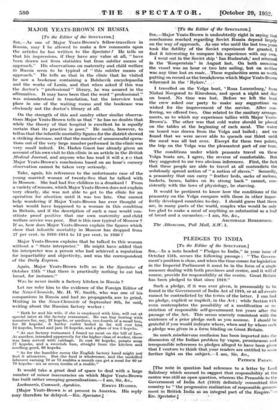MAJOR YEATS-BROWN IN RUSSIA [To the Editor of the SPECTATOR.]
Sin,—As one of Major Yeats-Brown's fellow-travellers in Russia, may I be allowed to make a few comments upon the articles he has written to the Spectator ? He tells us
that his impressions, if they have any value at all, " have been drawn not from statistics but from subtler means of approach." His observations on maternity and child welfare in Russia seem to be typical of " this subtler means of approach." He tells us that in the clinic that he visited he saw a bookcase containing a Bolshevik encyclopaedia and the works of Lenin, and that when asked if this was the doctor's " professional" library, he was assured in the affirmative. It may have been that the word " professional" was misunderstood in translation, but the interview took place in one of the waiting rooms and the bookcase was obviously not the doctor's library at all.
On the strength of this and sundry other similar observa- tions Major Yeats-Brown tells us that " he has no doubts that while the theory of that hospital is excellent he is equally certain that its practice is poor." He omits, however, to tell us that the infantile mortality figures for the district showed a striking decrease, and that the number of unsuccessful opera-
tions out of the very large number performed in the clinic was very small indeed. Dr. Haden Guest has already given an account of his own visit to this clinic in an article in the British Medical Journal, and anyone who has read it will a, ne that
Major Yeats-Brown's conclusions based on an hour's cursory observation cannot be taken very seriously.
Take, again, his references to the unfortunate case of the young married woman of twenty-five that he talked with in Moscow. She had had five children to a drunkard ! From a variety of reasons, which Major Yeats-Brown does not explain very clearly, she was not able to get to the clinic for an operation for abortion until it was too late. One cannot help wondering if Major Yeats-Brown has ever thought of what would have happened to a woman in this condition in Britain, and if the description of such a case would con- stitute proof positive that our own maternity and child welfare service was poor. But is this case typical of Moscow ?
If so, how does Major Yeats-Brown explain the figures which show that infantile mortality in Moscow has dropped from 27 per cent. in 1910-1914 to 12 per cent. in 1930 ?
Major Yeats-Brown explains that he talked to this woman without a " State interpreter." He might have added that
his interpreter was a person who had achieved a reputation for impartiality and objectivity, and was the correspondent of the Daily Express.
Again, Major Yeats-Brown tells us in the Spectator of October 15th " that there is practically nothing to eat but
bread, for instance."
Was he never inside a factory kitchen in Russia ?
Let me refer him to the evidence of the Foreign Editor of
the News-Chronicle, Mr. H. W. Smith, who was one of his companions in Russia and had po propaganda axe to grind, Writing in the News-Chronicle of September 8th, he said,,, writing about the Russian factory worker : " Both he and his wife, if she is employed with him, will eat at special rates at the factory restaurant.. He can buy herring with tomatoes for, say, 33 kopeks, or sardines, one-fourth of a small box, for 36 kopeks. A barley cutlet' boiled in fat will cost him 10 kopeks, bread and jam 16 kopeks, and a glass of tea '5 kopeks.
" At one factory restaurant I found no meat on the 'bill -of fare. At another, intended apparently for the higher class of worker, there was ham served with cabbage. It. cost 80 kopeks, potato soup 27 kopeks, and a sweetish bun, straight from the kitchen and smelling good, 60 kopeks.
"'As for the humbler menu the English factork hand might not find it attractive. But - the food is wholesome, and the unskilled labourer earning 70 or 75 roubles a month can get a meal for 60 or 70 kopeks—six or seven tenths of a rouble."
It would take a great deal of space to deal with a large number of minor inaccuracies on which Major Yeats-Brown has built rather sweeping generalizations.—I am, Sir, &c.;
Lochnorris, Cumnock, Ayrshire. MARYS HUGHES.
[Major Yeats-Brown is at present in America. Pis reply may therefore be delayed.—Eu; Spectator.]












































 Previous page
Previous page